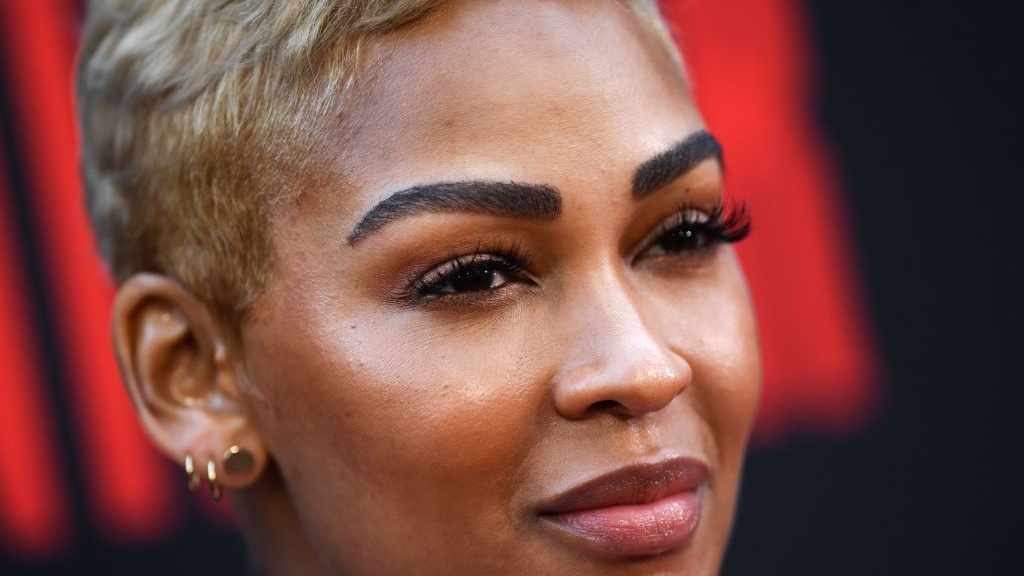Meagan Good is opening about a skin condition she experienced earlier this year, which led to speculations and shaming of the Love By The 10th Date actress on the internet.
The 39-year-old explained what led to the tumultuous experience in an interview with The Same Room, a faith-based platform.
"I went to an unlicensed aesthetician who convinced me that I needed to get rid of some sun damage. And a few months later, I am like five shades lighter than I actually am and it was a really traumatic experience because I really trusted the person," the 39-year-old told The Same Room. "I kept asking her through the process, like 'Is this what's supposed to happen?' She's like, 'Oh it'll lift and it'll come back.' I got to the place of realizing I don't know if it's going to come back."
In a time where racial tension has become rampant, Good said the hostile climate exacerbated her situation, making it "super embarrassing and super painful."
The actress, who said she often feels more than confident when she looks mirror, admitted that she felt like the bullies stole that sense of pride from her. But she was especially worried about what her younger fans would think about her.
"To feel like someone stole that from me and to feel like I was misled and now there's commentary on it and people thinking I don't love myself, that's something I can get through," Good said. "But when I'm thinking about these young girls, these young brown-skinned girls who are thinking that I've changed myself and what kind of ideas are putting into their head, that just broke my heart."
As the days went by, however, the devout Christian said she was able to find the silver lining.
"As I'm working through it, the blessing in it is, because we don't sometimes know why God allows certain things to happen. I was in a place where I couldn't really defend myself, so for the first time in my life, instead of actually defending myself, I had to sit back and let God and trust Him," Good said.
The Stomp The Yard actress added that adversity has made her stronger.
"I do feel a lot stronger and I feel thankful that I went through something that traumatic, and that I can use it to God's glory and say, 'No, I've actually been through that,'" she said.
Fighting back tears, the movie star said she is still recovering from the experience of being shamed.
"Even as I'm sitting here and I'm crying, I'm made stronger because somebody else is going through this," she said. "No matter what you've been through, your experience can really help somebody else. Just by being transparent about it and just allowing God to walk you through it, you now give someone else the license to walk through it too."
Good briefly talked about her skin condition in May when an Instagram user accused her of bleaching her skin, XoNecole reported.
“Megan looked better dark skin….She not so pretty anymore she looks average…But her dark skin was above average…Why did she bleach…,” the person wrote, replying to a video of the actress.
In response to the social media user, the Hollywood star explained her situation.
“I didn’t Queen,” Good told the Instagram user. “A[n] (unbeknownst to me) unlicensed aesthetician gave me a product to correct a sun damage mark on my forehead that messed up my skin. By the grace of God only I’m 80% through recovery and regaining my color daily. To be honest it was a beyond painful and traumatic experience because I would never wish that on anybody. I’d really appreciate if you wouldn’t continue to spread assumptions and rumors.”
According to Keck Medicine of the University of Southern California, there are certain conditions that only affect people with darker skin. But there are only a small number of dermatologists who specialize in skin issues for people of color and understand the unique circumstances. In recent years, however, more research is being done to help people with dark skin who face the challenge.
“Some skin conditions can occur exclusively in people with ethnic skin,” said Nada Elbuluk, MD, a dermatologist and director of the Skin of Color and Pigmentary Disorders Program at Keck Medicine of USC. “There are also skin conditions that can occur in anyone but are more common in darker skin populations. And then, there are some conditions that can occur in everybody, but they look different in darker skin and may need to be treated differently.”
Elbuluk said it can make all the difference when people of color see a dermatologist who understands their skin.
“By seeing a dermatologist who specializes in ethnic skin, you can get to the root of your condition and start getting answers,” she said.
